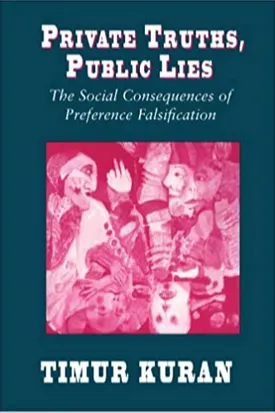Timur Kuran
Timur Kuran is a prominent scholar in economics and Islamic studies, as well as a prolific author. He is a professor at Duke University, where he holds the Gorter Family Professorship in Islamic Studies at the Sanford School of Public Policy and serves as Faculty Director of the Islamic Studies Center. Professor Kuran has written four books, including Private Truths, Public Lies, which is considered a classic work on economic behavior in times of social change. His other books, Islam and Mammon, The Long Divergence, and The Ottoman Centuries explore Muslim societies and the history and future of their economic and social systems.
Professor Kuran's books have received widespread critical acclaim. Private Truths, Public Lies has been hailed as "brilliantly researched and thoughtful," by the New York Times and "ingenious in its approach" by the Wall Street Journal. It examines the history of hidden preferences in modern societies, focusing mainly on the Middle East. Kuran demonstrates how, in times of rapid social or political change, preferences which are private or socially embarrassing can remain hidden, influencing individuals in ways that can be detrimental to the public interest.
In Islam and Mammon, Kuran explores how attitudes towards money and property evolved drastically over the course of centuries in Muslim societies, displaying how religious values and human aspirations intertwined to form a crucible in which grew the modern Islamic economy. Kuran argues that much of what we consider to be the cornerstones of modern Islamic economic thought have their roots in preconceptions which emerged from Muslim societies during the Ottoman era.
The Long Divergence looks at the history of the Middle East and compares its societies to contemporary Western nations, examining the unequal economic and social outcomes for countries in the region. Kuran argues that this disparity was caused by the slow divergence of the region from prevailing economic institutions of the West. He focuses on the role of religion-based norms and believes that other influences, such as racism and colonialism, have only had limited impacts.
Finally, The Ottoman Centuries traces the economic and social transformations which occurred in the Ottoman Empire as it developed from a predominantly rural and nomadic society to a more industrialized, urban society. Kuran explains how over several centuries, the old ways of agricultural production gave way to a new industrial order, with far-reaching implications for the people of the region. Along the way, he also highlights how the region's religious and cultural forces played a role in the changes.
Professor Timur Kuran's works have shaped the landscape of economic and Islamic studies, and he has contributed much to our understanding of the Middle East and its society. Throughout his written works, he demonstrates an acute understanding of economic and social changes and accurately portrays how different forces interact. Whether one reads Prof Kuran's books for pleasure or study, one is guaranteed a captivating journey through time and place.

